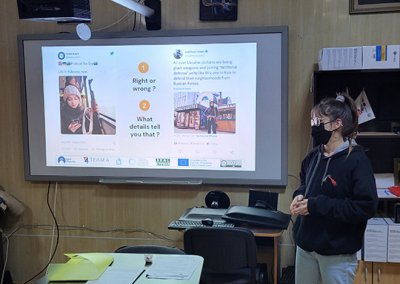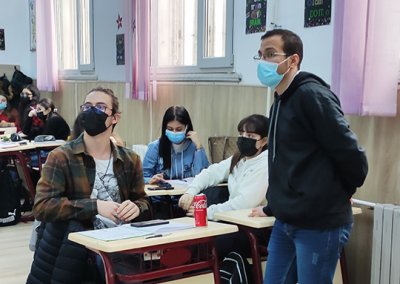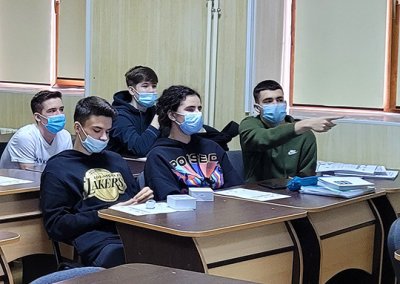Access and Inclusion
First of all, the beginning of March 2022 was dedicated to a new educational workshop theme for the Team 4 Excellence volunteers. From the 1st to the 7th of March, we prepared and presented our “Access and Inclusion” course to four classes in Mihai Eminescu National College, in Constanta. The classes were 10th grade-E, 9th grade-B, 10th grade-D and the 12th grade class.
To be clear, we focused on teaching young people the values and tools they need to access online. And, therefore, to feel fully included as a digital citizen. This topic is wide, so we focused on the importance of media contents in our democracies and the tools to control their truthfulness.
Facing the disinformation war about Ukraine
Before going straight to our topic, Ibrahim made each class play a game called “Pictionary”. Divided in two or four groups (depending on the size of the class), the students had to guess what was drawn on the board by one of their classmates. We made them guess words linked to our theme: “Newspaper”, “social media” and “fake news”.
Since the first class, on the 1st of March, our goal was to exchange with the high schoolers about the disinformation war ongoing. A few days before our workshop, Russia started to invade Ukraine and many of us were struggling to find trustworthy information about the conflict.
Therefore, Théo began our workshop by detailing the different roles of media in a democratic society:
- Provoke public debates, leading to important decisions
- Alert and mobilize the public opinion on injustices and humanitarian causes
- Let different views & ideologies to be expressed
- Allow politicians to defend their policies, but also to put pressure on them
Although, of course, those strong powers of influence only have a positive impact on democracy if they are true.
Learning to doubt social media…
At first, we trained the students to identify clues of disinformation. For the first activity, Lisa showed them screenshots of two recent tweets depicting Ukrainian civilians taking weapons to defend their country against Russian soldiers. Divided in four groups The high schoolers had to point out the details that showed the veracity of one and the falsehood of the other. Many of them quickly identified the false one!
- The false one was posted before the Russian invasion, lacked context and was posted by an unverified Twitter account.
- The right one was posted at the right time by the verified account of an American journalist and the text added context to the photo.
Then, Lisa listed the good habits to keep while consuming online news contents. From checking who are the authors of what you read, to checking your own biases.
… and to fact-check those information
Secondly, we made the students learn check if their doubts are right or wrong. For the first day of our workshop, we only showed them how to fact-check the false Ukrainian-with-weapons tweet. Using reverse search on Google or Yandex, you can find that one was originally posted by a Siberian girl one year ago!
However, starting by the second day of our workshop, we added a new type of activity: trying to fact-check by themselves. To sum up, each group of high schoolers and to choose one of those statements from the Ukraine-Russia war:
- “The Ukrainian president went to fight with his army against Russia”
- “Ukraine is giving 5 millions rubles to every Russian soldier who surrenders”
- “Ukrainian soldiers died heroically against Russians on Snake Island”
- “During the invasion, a Ukrainian woman teach on TikTok how to use an abandoned Russian tank”
Using their smartphones, the students had to check if this was true, false, or if it’s not clear yet. Most importantly, they had to find an online proof of it. In the end, we were surprised that they managed to find the right answer pretty quickly. Then, we showed our own fact-checking of those statements. (1 is false, 2 is true, 3 has to be confirmed and 4 is missing context)
We are really happy to see that the students managed to learn those fact-checking skills by themselves! According to the feedback we had from them, they really liked that we taught them useful knowledge about current events. We hope they will apply those good behaviors to their daily media consumption! 😊
Location: Mihai Eminescu high school, Constanta, Romania
Dates: 1st, 2nd, 4th and 7th of March, 2022
Want to see more about our Erasmus events?
Build confidence | Recognize own abilities | Broaden horizons




